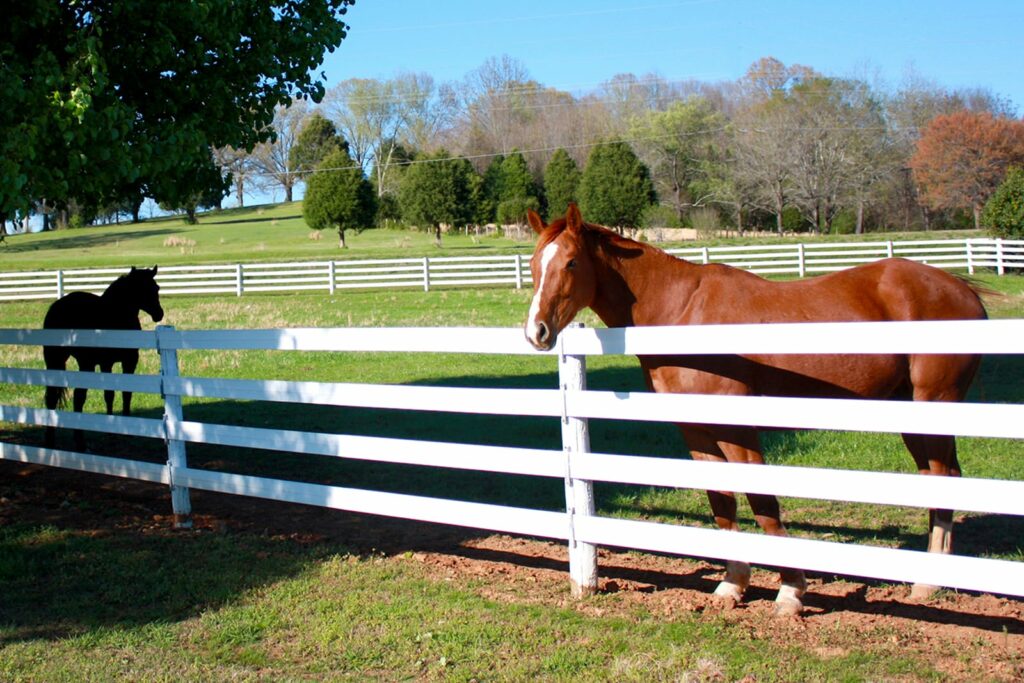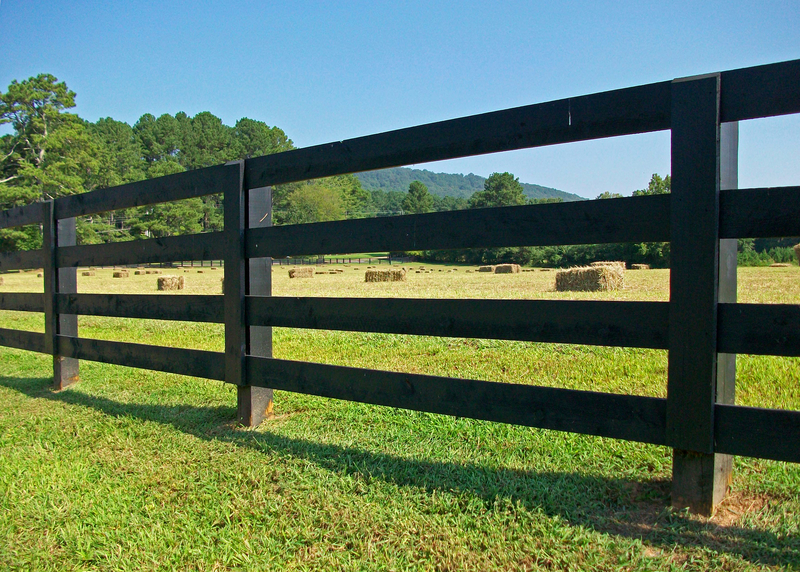Stock & Noble
The Top Horse Fencing Choice of Equine Vets: Which Option is Best for Your Horse?
- BY Tripti Kakkar

Horse fencing is an important aspect of equine care, as it not only defines the boundaries of a horse property but also ensures the safety and security of horses. With a plethora of horse fencing options available in the market, choosing the right one can be a daunting task.
Have you ever wondered what is the preferred fencing by experts who know all about animals, their behaviour and safety protocols?
As a premium horse fencing company, we often get inquiries from vets about the best horse fencing options for their facilities. Based on our experience of helping them find the right solutions to their needs, insights learnt on live vet projects and in-depth knowledge of fencing we have found that EquiRope is the most preferred option among vets.
It is a practical and highly effective option that fits within most vet clinics’ budgets. EquiRope is also safe for horses, leaving little to no markings on their skin if they come into contact with the fence.
In this blog, we’ll discuss in detail why vets prefer EquiRope for their fencing requirements and other horse fencing solutions that meet their requirements.
In the end, the choice of vets could help guide you in the right direction for your equine property.
Or if you’re a vet this article will inform you about the horse fencing choices made by other veterinarians and why, so you can make the best decision for your facility.
It is important to mention that to provide accurate and relevant information in this article, we will only feature fencing solutions from our portfolio. These solutions include Horse Mesh, Premium Steel Post and Rail, Horserail, and EquiRope.
Horse Fencing requirements by vets
Veterinarians often have their own practice or work within horse facilities that require fencing to cover a significant area. When it comes to choosing horse fencing for these facilities, vets have specific requirements to ensure that the fencing is practical, cost-effective, and safe for the horses.
Horse fencing should be practical:
In addition to being easy to install, vets typically need fencing that is practical and functional. This can include fencing that is designed to create separate enclosures for different horses or fencing that is designed to accommodate different activities, such as exercise and training.
Horse fencing should be cost-effective:
Vets understand that horse facilities have to operate within a budget. Therefore, they require fencing that provides good value for money. This can include fencing that is designed to last for years with minimal maintenance required.
Horse fencing should be safe:
Finally, the safety of the horses is of paramount importance to vets. The horse owners might leave their animals in the vets’ care for a few weeks. Therefore, they look for fencing that is designed to prevent horses from getting injured. This can include fencing that is flexible, has an option of electrics and prevents any serious injury to the horse.
Horse fencing should be presentable for a large facility:
Along with the key factors of cost, safety and practicality, when fencing a large facility, vets often prefer fencing that’s high on aesthetics. They need to make their centre presentable to attract the right clientele. The fencing should also be versatile enough to accommodate different terrain types and to create enclosures of various shapes and sizes.
Horse fencing solutions chosen by Equine vets
Mesh Fencing
Mesh fencing is a popular option for vets who want to ensure the safety of their horses, especially for foals. Due to their spindly and uncoordinated nature, foals are more likely to kick and rub against the fence, which can result in entanglement or injury. Mesh fencing is designed to prevent this by creating a barrier with smaller holes that the foal can’t get tangled in. This type of fencing is also durable and easy to maintain, making it a practical choice for vets.
Steel Mesh Fencing consists of galvanised steel wires that resemble a net with varying densities of top and bottom wires ranging from 2.5mm to 3.1mm. The spacing between the wires, also known as the aperture, is crucial for ensuring horse safety. Ideally, the aperture of Steel Mesh Fencing used on horse properties should not exceed 5cm x 10cm.
Compared to Post and Rail fencing, Steel Mesh Fencing is generally a more affordable option and is often combined with a top rail made of Timber post and rail, Cattle Rail, or the Buckley Steel Fencing System.
If you’re interested in this horse fencing solution, it’ll be worth digging deeper and learning if steel mesh is right for your property.
Premium Steel Post and Rail Fencing
Premium Steel Post and rail fencing is preferred by large vet centres that need statement fencing to make a great first impression and attract the right customers.
Our Premium Steel Post and Rail fencing called Buckley is a uniquely engineered Steel Fencing System, boasting a stunning design that complements any type of property for years to come. What sets Buckley apart from other fencing systems is its unparalleled safety for horses, combined with its eco-friendliness. The system is crafted from 2-sided pre-galvanised steel that is further protected by a phosphate conversion coating and finished with a top-quality polyester powder coat which is of architectural grade.
This makes Buckley a durable and sturdy option that will withstand the test of time, while also being kind to the environment.
This fencing is an aesthetically pleasing and practical fencing option, but it can be expensive. However, it’s important to understand the reasons why investing in a Buckley fencing system is worth considering.
Horserail Fencing
The biggest advantage of Horserail® is safety and the fact that it can be electrified. Vets, both those operating individually and those working in large vet centres, often prefer this option.
Horserail® is made of four-inch or 108-millimetre-wide UV-stabilised medium-density polyethylene, which is molecularly bonded to three strands of high-tensile wire.
Simply put, Horserail fences are flexible plastic rails that resemble traditional Timber rails. This fence has strong, straight, evenly spaced lines. The product is highly visible and comes in black or white.
The strong, smooth surface of the Horserail easily bends and flexes. This means that if your horse runs into, hits kicks or places a leg through the fence, the animal is less likely to be injured.
Horserail fencing is a flexible, low-maintenance, and good-looking option that can be electrified to ensure horses are safe and kept off the fence. It is also a popular choice for projects that require multiple fencing options.
Before buying Horserail, it’ll be worth learning about where to find the original Horserail® in Australia, so you can get the proven product and the best experience.
EquiRope Fencing
In our experience, the most preferred horse fencing by vets is EquiRope. This fencing option is practical, highly effective, and reasonably priced. It looks good and can cover a large area within a fixed budget while ensuring the safety of horses.
Even if horses come in contact with the fence, they are less likely to get injured, and minimal markings are left on their skin. Another advantage of EquiRope is it is a quick and easy installation. It is a complete fencing system and can be taken up as a DIY project ensuring you have a safe and secure electric fence.
Watch what a leading horse vet, Lindsay has to say about EquiRope:
EquiRope is a tensionable electric rope or braid designed specifically with horse safety in mind.
Simply put, EquiRope is 6 millimetres polyester rope that’s created for equine properties. 8 annealed copper wires are woven around the outside of the rope to carry electricity along the rope and give a shock to horses whenever they touch it.
It ticks all the boxes for practical, cost-effective and safe horse fencing requirements at vet facilities. It’s preferred by vets especially because it keeps the horses safe while in their care.
If you want to know all about this fencing, its advantages and disadvantages in detail, then check out the honest review of EquiRope electric braid.
Found out the preferred horse fencing solution by vets?
Choosing the right horse fencing option can be a challenging task but considering the requirements of vets can help you make an informed decision.
Now you know, while mesh fencing is ideal for foals, Buckley and Horserail are great options for large vet centres, and EquiRope is the most preferred option by vets for its safety, practicality, effectiveness, and affordability.
Another important factor is cost. Before you say yes to this horse fence, it’s a good idea to know the cost of buying and installing EquiRope. So you can confirm if EquiRope is right for your property and your budget. Ultimately the choice depends on individual needs and requirements.
If you have more questions on the suitability, cost, installation or maintenance of any horse fencing solution, feel free to book a personalised consultation. One of our fencing experts will reach out to you and answer all your queries to help you create a safe and beautiful equine property that matches your vision.




